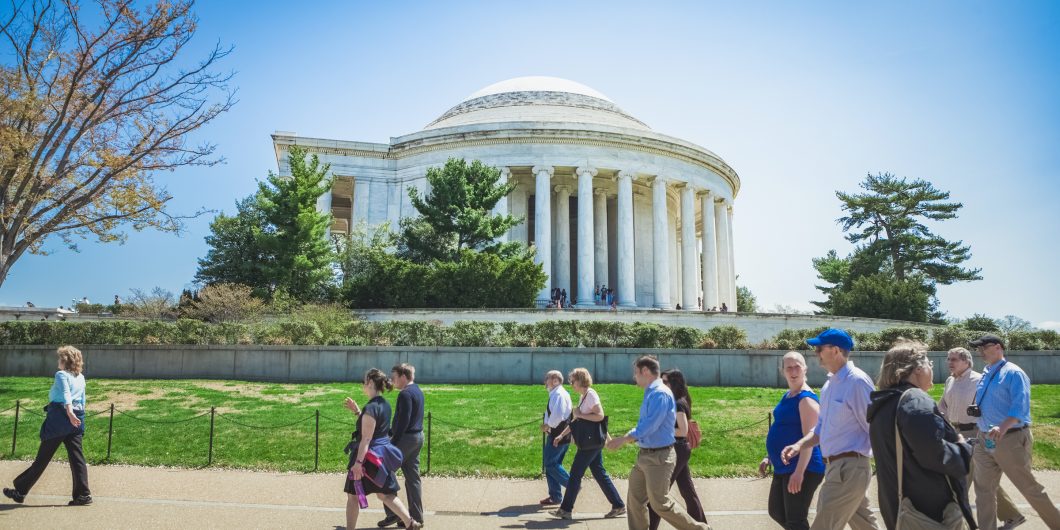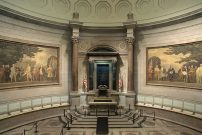Strang’s exploration of natural law as a justification of originalism is provocative and could move the debate in a new direction.
Can Aristotelian Friendship Save Liberalism?
Aristotelian civic friendship has the potential to make modern liberal political theory more descriptively accurate with respect to how Americans actually live, as well as more normatively attractive to us. That is the contention of Paul W. Ludwig in his detailed, scholarly book, Rediscovering Political Friendship: Aristotle’s Theory and Modern Identity, Community, and Equality (Cambridge, 2020). Liberal theory bolstered by civic friendship will be able to explain, for instance, why the numerous civic associations in the United States exist—it’s not only because of self-interest—and why they are valuable. It will also have the capacity to protect liberal theory from itself, because liberalism has the tendency to warp those citizens under its sway by forming them to value only part of what makes human life valuable: self-interest. “[L]iberalism is living off stored-up moral capital that liberalism cannot itself create,” and Ludwig argues that it needs civic friendship to broaden and enrich Americans’ character to include the public-spiritedness that love of one’s fellow citizens elicits.
Ludwig aims for a broad audience that includes both scholars and the general reader. Many parts of the book are accessible to educated lay readers. He begins with an anecdote open to all Americans who have visited Washington, D.C. Ludwig and his son enkindle a relationship with what appear to be complete strangers from Utah. “[W]e struck up a conversation about where they had visited in the nation’s capital. The conversation became animated and heartfelt and lasted for two hours.” And yet, perhaps these people were actually friends, but friends of a sort that modern liberal theory has difficulty explaining: civic friends.
Other parts of the book are likely best suited to scholars, such as Ludwig’s deep engagement with Aristotle’s work along with contemporary liberal theorists. For example, in the process of describing the nature of friendship, Ludwig delves into Aristotle’s use of the aphorism that “mothers love their children more [than fathers],” and uses it to exemplify what may appear to be the paradoxical character of friendship: that friendship is both self-centered and other-regarding. Ludwig recognizes this mixed audience and advises readers that section introductions advertise that section’s topic, which readers can use to judge whether to read that particular section. Moreover, Rediscovering Political Friendship is a complex book with many interlocking parts and arguments, many layers, and hundreds of thick citations to and engagement with the various literatures on the topics he treats.
Once you have finished Rediscovering Political Friendship, you come away with the conviction that Ludwig deeply engages with the subjects of civic friendship and liberalism, and provides a well-designed synthesis of the two. Ludwig’s arguments are thoughtful and charitable, and peppered with homey examples from ordinary life to bolster his more abstract claims. Ludwig’s serious and relatively detailed proposals (interspersed throughout the book) about political, legal, cultural, social, and other changes to current practices help elucidate his arguments and present a picture of a way of life more satisfying for Americans.
Ludwig’s Approach to Political Friendship
Rediscovering Political Friendship is broken into four major parts. The first part works toward an accurate—Aristotelian—understanding of friendship; the second part argues that, in modern, Western nations, civic friendship occurs primarily via civic associations; the third part contends that civic friendship extends out to include many of the activities engaged in by citizens including commerce; and part four describes relatively concrete policy prescriptions derived from the book’s prior claims about civic friendship.
Civic associations are the myriad groups of citizens, large and small, who share a common conception of and love for the good life.
The longish introduction does an excellent job laying out the problem Ludwig intends to solve and road-mapping how he does so. Ludwig explains that Americans engage in practices where they act and feel like civic friends, but the dominant versions of liberalism won’t call it that, and Americans have been socialized not to see it, which leads to “a problem: if we have civic friends, if we are civic friends, we have them and are friends thoughtlessly, without realizing it.” To make matters worse, Americans regularly try to account for their actions, both personal and political, in terms of self-interest. “By far the biggest reason for the eclipse of civic friendship in our thinking appears to be the economic basis of our politics.” Americans received and zeroed-in on this economic focus from the founders of modern liberalism, such as Adam Smith and John Locke. Ludwig’s goal is to re-introduce Americans to civic friendship, which he claims can better account for Americans’ own practices and holds out the promise of making those practices better.
Here, I will now provide a short summary of Ludwig’s argument with the caveat that this description simplifies some of the complexity. Each chapter includes deep engagement with Aristotle’s thought and with modern liberal theories that serve as foils. Along the way, Ludwig offers policy proposals based on his Aristotelian conception of civic friendship.
Early in the work Ludwig argues that Aristotle’s conception of friendship is based, at least in part, on self-assertion and anger. The connection between friendship and anger may appear counter-intuitive, even paradoxical, yet Ludwig follows Aristotle to show that such a connection exists because of friendship’s origin in our passions. For evidence of this connection, Aristotle pointed to the greater anger that we feel when slighted or harmed by a friend than by a stranger. Ludwig leverages this connection to then argue that civic friendship accounts for the place of identity politics and civic associations in Western societies because identity groups are the product of a passionate love to have one’s (group) identity recognized. He then refines and defends the Aristotelian conception of friendship that includes friendships of utility, and even sacrificial friendships (that include, paradoxically, self-interest by the sacrificing-friend).
Ludwig is interested in how liberal political theory and liberal states substituted civic associations for civic friendship. Civic associations are the myriad groups of citizens, large and small, who share a common conception of and love for the good life. Fraternal groups, religious organizations, political advocacy groups, and homeowners’ associations are just a smattering of the tremendous number and variety of such groups in the United States. They are especially common in the fertile ground of middle-class regimes. Aristotelian civic friendship better captures the phenomenon of civic associations than individual self-interest. In fact, civic associations act as the primary mechanism whereby citizens exercise civic friendship in liberal societies, both toward fellow members and toward all citizens. Ludwig is careful to note that liberalism’s embrace of his civic-friendship conception of civic associations will not open the door to illiberal outcomes, such as one political, economic, or religious group controlling the broader society.
The latter portion of the book moves Ludwig’s civic friendship account beyond the confines of civic associations and shows that many of the activities citizens commonly engage in, especially commercial transactions, are sources of society-wide civic friendship. Society-wide civic friendship can grow out of commercial relationships—Aristotle’s “business friendship”—and this form of civic friendship is hospitable to liberalism because of its premises of liberty and property. Ludwig’s argument extends still further to encompass the “shared assumptions about the regime under which citizens live” and contends that citizens feel an affinity both for the regime and their fellow citizens because of what they share.
The last chapter contains a series of admirably detailed policy proposals including prescriptions for a just wage, a revised immigration policy, modest valuing of identity groups, and compulsory national service.
Would Civic Friendship Revive Liberal Polities?
Ludwig’s diagnosis is similar to R.R. Reno’s in Return of the Strong Gods (and others of the genre such as Patrick Deneen’s Why Liberalism Failed). Reno argued that elites in the post-World War II West believed that the cause of the 20th century’s calamities was the passionate pursuit and love of the “strong gods”: love of country, zeal for religious truth, and idolatry of race or nation. This diagnosis led leaders in the West to break down Westerners’ attachments to nation and religion—and truth—as a way to neuter the passions that caused so much distress.
Ludwig contends that civic friendship “has broad enough appeal to bridge the ideological gap between progressives and conservatives.”
Ludwig’s description of the West is similar, but he pushes back the start of the West’s move toward the weaker gods to the advent of liberalism itself. “Liberals thus sought to defang or defuse fanatical civic passions, preferring weaker but extended bonds in place of the riskier tight ones.” This move is crucial to Ludwig’s thesis because he argues that liberalism attempted to remove the firmer identifies of religion, nationality, and family—the ones that cause so much civil strife—for tamer “self-interest.” Ludwig does not provide a robust explanation for this thinning out of liberalism, but his thesis is likely compatible with Reno’s. Indeed, Reno’s description that the “postwar consensus is, at root, fearful of love” matches well with Ludwig’s account of civic friendship being partly a matter of the passions and therefore not utilized by modern liberals. Nor is a fulsome explanation necessary to Ludwig’s thesis so long as it is the case that today’s mainstream liberalism focuses on individual self-interest, which Ludwig documents.
Ludwig’s book, unlike Reno’s (except for the last few pages), is fundamentally positive about the American (and modern Western) project. The founders of liberalism did not claim that self-interested individualism was the only aspect of human communal life in which liberalism was interested. Current liberal political theories have forgotten their founders’ counsel, and according to Ludwig this occurred for a variety of reasons rooted in intellectual history. These include the Christian reconceptualization of friendship as purely other-regarding and the Enlightenment equation of reason and self-interest espoused by liberalism’s founders. But Ludwig provides a strong argument that civic friendship can fit within liberalism and help correct its blind spot(s) to important but neglected aspects of human life, like friendship. Ludwig’s “liberal theory of civic friendship” also holds out the promise, he contends, of preventing a shift toward “blood- or race-based” sources of meaning and identify.
In the end, like Reno’s, Ludwig’s diagnosis and prescriptions regularly point to and would lead to increased civic solidarity among Americans. For instance, Ludwig identifies the “vast disparities in social rank” with its accompanying disparities of wealth and income as a problem for the United States, and argues that civic friendship is a tool that can fruitfully diagnose and build a consensus to cure such disparities. He contends that civic friendship “has broad enough appeal to bridge the ideological gap between progressives and conservatives.” For instance, Ludwig argues that income disparities among Americans could be partially alleviated if companies internalized a commitment to generous wages, which would provide recognition for workers’ contributions, and if high-paid company executives recognize that they can attain greater honor through charitable giving than through exorbitant salaries. This proposal could increase solidarity, but it does seem to be a very long-term goal, as Ludwig himself appears to recognize because he notes that CEO’s devoted to charity instead of high pay “would have been a very different people.” To make “very different people”—St. Paul’s conversion experience notwithstanding—typically takes a lifetime.
Rediscovering Political Friendship is a well-argued, complex, scholarly attempt to remedy a widely-recognized deficit in modern liberalism. Ludwig explains the Aristotelian notion of civic friendship, identifies defects in liberalism’s account of individual, group, and national life, and proposes civic friendship as a remedy to those defects.



